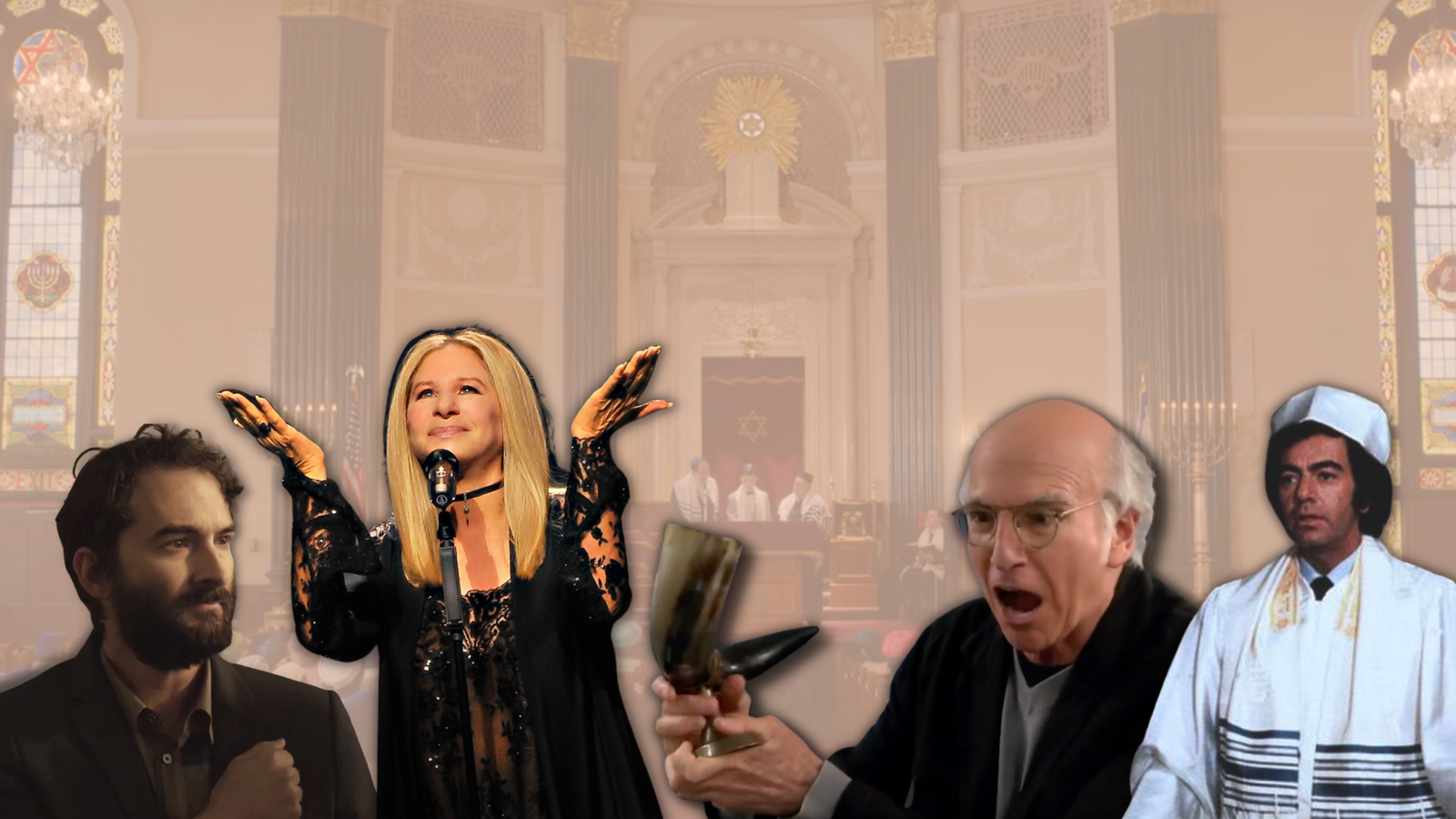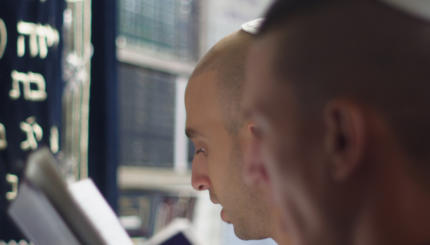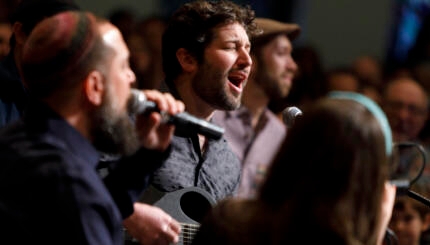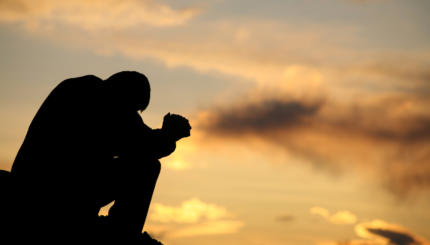You might not equate Hollywood with holiness, but if you watch closely, you can often catch snippets of Jewish prayer popping up in movies, music and TV shows. Here are some of our favorite Jewish prayer moments in pop culture.
1.”The Frisco Kid”
Prayer: Aleinu
This 1979 western comedy features Gene Wilder as a rabbi who secures the help of an outlaw (Harrison Ford) to help get him to San Francisco. There are loads of Jewish references in this movie, but in the clip below Wilder, clad in tallit and tefillin and shuckling like his life depends on it, recites the Aleinu prayer.
2. “The Wonder Years”
Prayer: Torah Blessings

Help us keep Jewish knowledge accessible to millions of people around the world.
Your donation to My Jewish Learning fuels endless journeys of Jewish discovery. With your help, My Jewish Learning can continue to provide nonstop opportunities for learning, connection and growth.
This classic ABC sitcom chronicles the 1960s suburban childhood of Kevin Arnold (Fred Savage). In the 1989 episode “Birthday Boy,” Kevin’s best friend Paul is called to the Torah for his bar mitzvah, reciting the blessings in Hebrew and chanting the first part of the Torah portion that recounts the violence visited by Amalek on the ancient Israelites after their departure from Egypt.
3. “Who By Fire?”
Prayer: Unetaneh Tokef
Jewish themes suffuse the work of the poet and songwriter Leonard Cohen, but few connect as directly to a specific piece of Hebrew liturgy as well as “Who By Fire,” which draws heavily from the High Holiday prayer Unetaneh Tokef. The prayer lists the various ways in which death is visited upon the unrepentant, and Cohen puts his particular spin on it: “And who in her lonely slip, who by barbiturate?”
4. “Rocky III”
Prayer: Mourner’s Kaddish
During a pre-fight scuffle with Clubber Lang (Mr. T), longtime coach Mickey Goldmill (Burgess Meredith) is shoved and suffers a heart attack. Rocky (Sylvester Stallone) goes on to lose the fight to Lang in a knockout. At Mickey’s funeral, Rocky recites the Mourner’s Kaddish, prompted line by line by a rabbi.
5. “The Jazz Singer”
Prayer: Kol Nidre
Neil Diamond’s 1980 remake of the 1927 Al Jolson classic tells the story of Yussel Rabinovitch, a New York cantor lured to California by the promise of a music career. After splitting from his wife and taking up with a non-Jewish woman, he is disowned by his father. At the film’s end, Yussel returns to New York to chant the Kol Nidre prayer and reconcile with his father.
6. “Transparent”
Prayer: Viddui
Among the most Jewish television series in recent years, “Transparent” is the story of Maura Pfefferman, a transgender woman living in Los Angeles, and her three grown children. Josh, the only boy, is dating a rabbi, and the scene in her synagogue on Yom Kippur includes one of the most accurate and unnerving depictions of the Viddui prayer ever committed to film.
7. “Curb Your Enthusiasm”
Prayer: Sim Shalom
Larry David’s L.A. comedy may be the only show on television that gives “Transparent” a run for its money when it comes to the sheer volume of Jewish references. Shabbat, Yom Kippur, the Israeli-Palestinian conflict, the Holocaust — all have been the targets of David’s irreverent humor. In this scene, Larry is ejected from services on Yom Kippur after he purchases tickets from a scalper.
8. “Mad Men”
Prayer: Priestly Blessing
Copywriter Michael Ginsberg (Ben Feldman) doesn’t command nearly the same interest as the show’s leading man Don Draper (Jon Hamm), but he does have a compelling Jewish backstory, having been born in a concentration camp and adopted as a young child. When he arrives home one day to tell his father Morris (Stephen Mendel) that he was hired by an ad agency, Morris puts his hands on his son’s head and recites the Priestly Blessing.
9. “Avinu Malkeinu”
Prayer: Avinu Malkeinu
During her rise to fame in the 1960s, Barbra Streisand refused to sacrifice her Jewishness for more opportunities in Hollywood. While she has released four Christmas albums, Babs has also been known to perform own version of the High Holiday prayer Avinu Malkeinu in a mix of Hebrew and English.
READ: Hey Alma’s Guide to the High Holidays in Pop Culture
10. “Grey’s Anatomy”
Prayer: Shalom Rav
Watch a clip of the scene on Facebook here.
The Season 15 finale of Grey’s Anatomy is centered around a gruesome car pileup. Frances (Jane Wall) has a panic attack while the ambulances struggle to reach her. In an effort to calm her, surgical resident and sole Jewish Grey’s character Levi Schmitt sings “Shalom Rav,” explaining that his parents’ used to sing it as a lullaby. The popular melody was originally written by Cantor Jeff Klepper and Rabbi Danny Freelander in 1973 as counselors at URJ’s Eisner Camp.
11. “The Patient”
Prayer: Mourner’s Kaddish
This FX miniseries series follows a sociopathic serial killer named Sam (Domhnall Gleeson) as he kidnaps his Jewish therapist (Steve Carell) and seeks treatment by holds him captive. Executive producers and co-writers Joe Weisberg and Joel Fields, the son of a rabbi, drew inspiration from their Jewish upbringings for several themes and scenes throughout the show, including a Kaddish scene.
In Episode 7, the therapist, Dr. Alan Strauss, explains the ritual of reciting Mourner’s Kaddish to Sam. Sam struggles to learn the words and ends up just waving over a dead body and saying the word “Kaddish.” The episode concludes as Strauss symbolically recites Kaddish to grieve the hope he has lost.
12. “Raiders of the Lost Ark”
Prayer: B’rikh Shmei
Though it’s a little hard to make out, this 1981 Steven Spielberg classic might take the prize for most obscure Jewish prayer to appear in film. When Nazi sympathizer René Belloq (Paul Freeman) goes to open the Ark of the Covenant, he recites a passage from the Aramaic prayer B’rikh Shmei, which is traditionally recited prior to the reading of the Torah.
13. “A Serious Man”
Prayer: Torah service
This may be the most Jewy of all the Coen brothers’ movies. While the film is mainly focused on the travails of Larry Gopnik (Michael Stuhlbarg), a physics professor living in suburban Minnesota, the funniest depiction of Jewish prayer is when Larry’s son Danny (Aaron Wolff) gets seriously stoned before his bar mitzvah and can barely make it through the reading.
14. “The Marvelous Mrs. Maisel”
Prayer: Torah service
There are too many Jewish moments to count in “The Marvelous Mrs. Maisel,” and a few episodes even include scenes inside a synagogue sanctuary at Yom Kippur and Shabbat services. In Season 4, Episode 3, Moishe Maisel (Midge’s former father-in-law played by Kevin Pollack) finds himself preparing to have the honor of an aliyah to the Torah at a bar mitzvah. The only problem? Moishe has no idea who the boy, Akiva (Joshua Turchin), is.
From dramatic exits, copious amounts of Yiddish, excellent chanting of prayers and Hebrew pronunciation, a synagogue feud and references to Genesis and Deuteronomy, this bar mitzvah episode truly has it all.
Read a recap of the episode from Kveller.com.
15. “Homeland”
Prayer: Mourner’s Kaddish
“Homeland,” an American adaptation of the Israeli show “Prisoners of War,” depicts a prisoner of war (Damian Lewis) who has been returned home and is suspected to be a double agent. In season two’s dramatic final scene, the CIA’s Middle East division chief Saul (played by Mandy Patinkin) recites the Mourner’s Kaddish for colleagues that were killed in an attack earlier in the episode.
Check out Hey Alma’s roundup of the 18 Best Passover Episodes on TV
tallit
Pronounced: tah-LEET or TAH-liss, Origin: Hebrew, prayer shawl.

Help us keep Jewish knowledge accessible to millions of people around the world.
Your donation to My Jewish Learning fuels endless journeys of Jewish discovery. With your help, My Jewish Learning can continue to provide nonstop opportunities for learning, connection and growth.
tefillin
Pronounced: tuh-FILL-in (short i in both fill and in), Origin: Hebrew, phylacteries. These are the small boxes containing the words of the Shema that are traditionally wrapped around one’s head and arm during morning prayers.

Help us keep Jewish knowledge accessible to millions of people around the world.
Your donation to My Jewish Learning fuels endless journeys of Jewish discovery. With your help, My Jewish Learning can continue to provide nonstop opportunities for learning, connection and growth.



